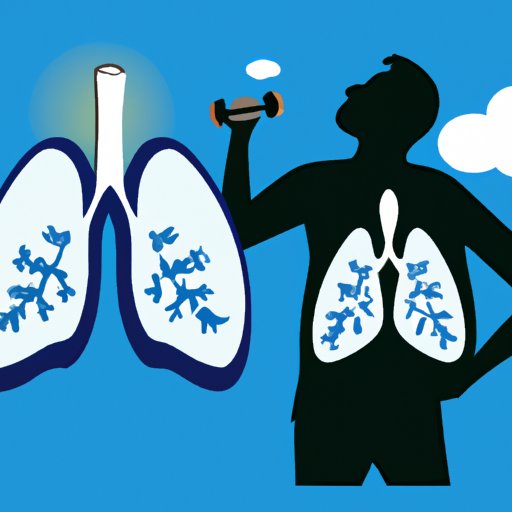Introduction
Lung health is essential for overall wellbeing. Your lungs are responsible for bringing oxygen into your body and expelling carbon dioxide, and they can be greatly impacted by lifestyle choices. If you’re looking to improve your lung health, there are several steps you can take to make sure your lungs are functioning at their best.
Quitting Smoking
One of the most effective ways to improve your lung health is to quit smoking. According to the American Lung Association, “Tobacco smoke contains thousands of chemicals that can damage your lungs and your entire body.” Quitting smoking can reduce your risk of developing lung cancer, COPD and other respiratory diseases. Additionally, it can help improve your heart health, reduce your risk of stroke and improve your overall quality of life.
If you’re ready to quit smoking, there are several tips that can help you on your journey. First, set a quit date and stick to it. Make sure to tell your friends and family so they can help support you. Consider joining a smoking cessation program or seek out counseling if you need extra support. Finally, try to find healthier alternatives to smoking, such as taking walks or chewing gum.
Exercise Regularly
Regular exercise can also help improve your lung health. Exercise helps strengthen your cardiovascular system, which in turn helps your lungs work more efficiently. According to a study published in the European Respiratory Journal, even moderate levels of physical activity can reduce symptoms of asthma, bronchitis and other breathing problems.
To get the most benefits from exercise, aim for at least 30 minutes of moderate exercise per day. This could include activities such as walking, jogging, swimming, biking or even dancing. You can also incorporate strength training exercises into your workout routine to help build muscle and improve your lung capacity.
Eating a Healthy Diet
Eating a healthy diet is another key factor in improving your lung health. Eating a balanced diet that includes plenty of fruits, vegetables, whole grains and lean proteins can help keep your lungs strong and healthy. Additionally, foods high in antioxidants, such as blueberries and dark leafy greens, can help reduce inflammation in your lungs.
It’s also important to limit your intake of processed foods and saturated fats, as these can have a negative effect on your lung health. Try to focus on eating whole, unprocessed foods whenever possible and look for ways to add more nutrient-dense foods into your meals and snacks.
Avoid Pollutants
Air pollution and other environmental pollutants can have a significant impact on your lung health. Long-term exposure to air pollution has been linked to an increased risk of respiratory illnesses, such as asthma and COPD. Additionally, pollutants in your home, such as mold, mildew and dust mites, can also affect your lung health.
To reduce your exposure to pollutants, make sure to change your air filters regularly and use an air purifier in your home. When outside, try to avoid areas with heavy traffic or industrial sites. Additionally, wear a face mask when necessary to further protect your lungs.
Get Vaccinated
Finally, getting vaccinated is an important step in protecting your lung health. Vaccines can help protect you from viruses and bacteria that can cause serious respiratory illnesses, such as influenza and pneumonia. The Centers for Disease Control and Prevention (CDC) recommends all adults over the age of 65 get vaccinated against the flu and pneumonia each year.
Additionally, if you’re a smoker or have a weakened immune system, you should consider getting the pneumococcal vaccine, which can help protect against certain types of pneumonia. Talk to your doctor to see which vaccines may be right for you.
Conclusion
Improving your lung health is an important step in maintaining overall health and wellbeing. Quitting smoking, exercising regularly, eating a healthy diet, avoiding pollutants and getting vaccinated can all help improve your lung health and reduce your risk of developing respiratory illnesses.
By following these steps, you can ensure your lungs are functioning at their best and enjoy improved health and wellbeing.
(Note: Is this article not meeting your expectations? Do you have knowledge or insights to share? Unlock new opportunities and expand your reach by joining our authors team. Click Registration to join us and share your expertise with our readers.)
